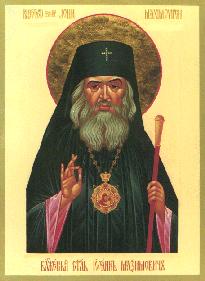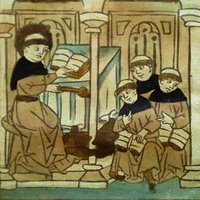The place of Fr. Seraphim Rose in the Orthodox Church
Blessed Father Seraphim Rose, Monk (+2 September 1981)
Those who Thy glory shall attain,
How wondrously Thy grace doth train!
O God unseen, how very near
Art Thou, their vows and prayers to hear.
Far from the only home they love
They lift their hearts and hands above,
And greet their mansions in the sky,
With many a tear and longing sigh.
Since death to Thee must shew the way,
Their flesh with toils and fasts they slay,
And long for that dear hour to come
When death shall call their spirits home.
By torments swift, and sudden pain,
The Martyrs heavenly glory gain,
But these, to make their crown secure,
A daily, lingering death endure.
+ All laud to God the Father be;
All praise, Eternal Son, to Thee;
All glory, as is ever meet,
To God the Holy Paraclete. Amen.
--Tua beandos gloria, Vesperal hymn for the Common of Abbots, Hermits, and Monks, from the Breviary. The English translation may be a bit contrived in order to fit into rhyme, but the point is understood.
++++++++++++
The Orthodox world, being what it is, has conflicting opinions of Fr. Seraphim. Besides what may be the majority of Orthodox with views in the middle of the road, there are, of course, the extremists. On one hand, you have the malicious revilers, those who call him a gnostic or even, very bizaarely, a Nestorian. On the other hand, you have the eager beaver cleavers who hang onto every word he wrote and don't seem to get any farther than that. Obviously, Father Seraphim means many things to many people--perhaps too many things to too many people. For this reason, along with the imminent end of the world (which we've been expecting for 2,000 years, by the way--not to disparage those who believe the end is near, the world is certainly not rushing toward a blessed utopia), I think that Fr. Seraphim will not be glorified on earth before the meek inherit it.
If, however, Fr Seraphim is glorified, I wonder what the Eastern Rite service texts will look like. (The Western Rite texts will probably be the same as for a Confessor or Monk with perhaps a proper Collect.) I must say, though, that not all liturgical texts for saints really do justice to the saint, if that's a way to put it.
For example, the ROCOR akathist to St. John of Kronstadt reads more like an apologia for right-wing Russian politics than a witness to St. John's holiness, his love of the poor, his dedication to priestly service. I would love to see a translation of the Moscow Patriarchate version for comparison purposes. St. John Maximovitch's akathist, which, if I'm not mistaken, was written by Fr. Seraphim Rose, is also not very--I don't know--appealing, something I could read over and over again. (It's sort of fit into a mold, if you will.) This could be a problem with Byzantine Rite liturgics in the first place--there are just too many things one has to put into a service--unlike the Western Rite where one can't put in as much as one would like. Byzantine liturgics vary widely in their content and quality and Western liturgics vary only ever so slightly.
I could imagine Fr. Seraphim being venerated as some kind of visionary or teacher. Of course, one of his main attractions is that he is a white-bread American convert to Orthodoxy, like so many of us, and, indeed, I think a case could be made that he displayed what I would consider the most worthy attributes of American culture, together with the true Orthodox monastic spirit.
It's interesting that, as much as his own writings get promoted so often (like "Orthodoxy and the Religion of the Future"), he was more of a translater than a writer--and a very skilled translator at that, being able to read a Russian text and record the English translation on a cassette tape. And, even as a writer, he was more of a relayer or redacter of patristic teaching, especially 18-19th century Russian patristic teaching which is NOT different essentially from ancient patristic teaching, it's just for a different age with different issues.
More than these things, however, I think of Fr. Seraphim as an example of repentance. Personal repentance is too often swept under the rug in the lives of and liturgical services for saints, in my opinion, which is too bad because we are living in an age in need of repentance (what age wasn't?). More investigation should, of course, be done into the circumstances and fruits of his repentance, if this is possible. However, I'm not sure how much real academic research can be done at this point, since Fr. Seraphim already has a kind of mythic aura around him. The historical record is obscured by the legend of Father Seraphim and also by the debacle between Fr. Herman and the Church Abroad after Fr. Seraphim died.
Thus, investigatory committees that look at eye-witness testimonies and writings will probably never be able to reveal his sanctity to everyone's satisfaction. That's why I think that, if Fr. Seraphim is to be venerated more widely and glorified, God will reveal his holiness in some way.
Even though Orthodoxy does not require miracles of its saints, miracles serve as a means of dispelling doubts, as well as increasing love for the saint. A miracle worked through a saint's prayers builds a very strong and special relationship between the saint and the person or persons for whom the saint worked the miracle.
I'm not sure, but right now at 1 a.m., I can only think of 2 American saints--St. Herman of Alaska and St. John of San Francisco, both Wonderworkers in their earthly lives--who have worked miracles after death. The others were glorified for their holy lives, their martyrdom, their selflessness and zeal for spreading the Word of God, which is, of course, good enough reason for venerating them.
So, even if Fr. Seraphim works no miracles, one cannot deny him his zeal, his selflessness, the sacrifices he made and the pains he endured for the sake of Christ. Not to mention what appears to be a victory over many, many temptations and sins. Perhaps this will come to light, or perhaps God is saving it for the real, heavenly life, I don't know. I do know, however, that Fr. Seraphim's books--those he wrote and those he translated, are making a big impact on Orthodox Christians throughout the world, especially in Eastern Europe and the former Soviet Union. This is very good because his writings are Orthodox and traditional. Also, his veneration is spreading in America. Many have visited his grave and several different Orthodox clergymen have concelebrated at the anniveraries of his repose. I hope that knowledge of his work and sanctity will grow even more so that it will be possible for people to get to know and love Fr. Seraphim. In my view, he appeals to a lot of people for various reasons. It's just hard to see through the clouds of denunciation, hyper-enthusiasm, and the way Fr. Seraphim's life and works have been used to justify so many agendas of lesser folk. All those things hide his real qualities, in my opinion.







2 Comments:
Thanks for reading, I hope my post involving Eastern Orthodoxy was accurate enough. How'd you like that picture of Czar Nicholas displaying the Icon to his soldiers? Pretty amazing eh? Do you know anything about the legend about Stalin ordering that Liturgy in 1941?
I like Seraphim Rose. I don't think he was right about everything but he strikes me as rather like the English writer on mysticism, Evelyn Underhill, in that he's kind of unpredictable both in saintliness and shortcomings. And, like her, he's tangible. We know his world. We don't have to find a Tardas or a Time Machine or get a degree in ancient history to have a sense of what motivated him. There again, spend enough time in rural England and you begin to feel the ancient saints so perhaps I'm rambling :) I only started commenting to thank you for the names of the Swiss saints in the sidebar. I am so interested in the saints of Western Europe and I love finding new names to research.
Post a Comment
<< Home